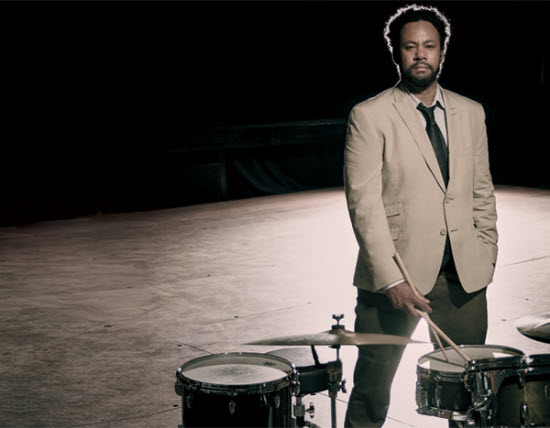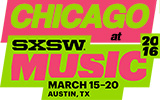| « Jeff Daniels Made SPACE Feel Like Home | North Coast: Day One » |
Interview Wed Aug 27 2014
Jazz Speak with Mike Reed
By Stuart Ross
Mike Reed is an example of a Chicago musician we can't take for granted. Born and raised in Evanston, Mike has been an integral part of the Chicago music community for more than 15 years. He showcases his dynamic, skin-tight percussion work with groups like People, Places & Things. And he has a hand in producing a number of events in the city, from the Pitchfork Music Festival to this weekend's free Chicago Jazz Festival at Millennium Park, the Cultural Center and elsewhere around town. The festival kicks off Thursday at noon. See a full schedule.
I spoke with Mike about some of his recent performances and what's upcoming at the festival.

You've been involved with the festival for several years. How did this come about and what were some of your programming goals this year?
I'm involved in this work through being a board member of the Jazz Institute of Chicago, which has been the programming and planning partner since the inception of the festival. The event itself is produced by DCASE, so this is a partnership event with a long history. It's actually the oldest of all the free city festivals.
The committee is made up of eight members, pulled from the larger jazz community as well as the insights of many other friends and consultants. Because of this larger context there's a lot of ideas that circulate on what we're programming and why. We of course want to try and represent the large swath that makes up jazz and especially jazz in Chicago. We don't always succeed in the ways we want to, but it's such a huge task that no one could fulfill every desire.
Among other highlights, this year's festival will feature Ernest Dawkins's "Tribute to Nelson Mandela."
The composition uses the lens of Mandela's life to focus on how the sounds and images of American jazz musicians from the United States were an important influence on the development of political discourse of resistance in apartheid South Africa. The piece acknowledges the contributions of the South African exile community and the musicians who pursued freedom both in their lives and music. Bringing together musicians from Chicago, South Africa and London, the ensemble will represent these interconnected histories and mutual influences.
Not to pick favorites, but what are you looking forward to this year?
These are some artists that I would point out as notable for people who are just getting into jazz or want some suggestions.
One is the George Freeman/Mike Allemana Quartet on Friday. George is a Chicago legend, who cut his teeth backing the likes of Charlie Parker and Lester Young, and then found his way into the soul-jazz experiments of the '70s. George is 87 years old, and the man can still cut the mustard as one of the most unique voices Chicago has heard on the guitar. Mike Allemana, longtime guitarist and musical director for George's brother Von Freeman, is equally comfortable playing mainstream bop and unleashing his own meticulous harmonic invention.
Another is the vocalist Cecile McLornin Salvant on Sunday. Cecile is one of the hottest singers to emerge in the past decade. She sings in English, French and Spanish and has stunning range and an unerring knack for stretching words and phrases.
And celebrating the 100th birthday of Sun Ra seemed like the proper way to close out the festival on Sunday night. Chicago is essentially the place where Ra fully formed the identity and the original line up of the Arkestra. One of those original members, Marshall Allen, has been directing the band and will lead this closing set excursion.
You performed with Roscoe Mitchell this month, to celebrate the release of your second duo recording, In Pursuit of Magic, out from 482Music. Can you speak a bit about that project and what it's like working with Mitchell?
I consider myself very lucky to be able to do a performance with Roscoe a few times a year. At this point, I've participated in performances of his ranging from a quintet to large ensembles. Roscoe also joined my group Loose Assembly on a few occasions and on a CD we released in 2009. These duo settings are intense, because it gives me no place to hide in the improvisations. I'm glad he suggested we do it a couple years back.
There's a comment Ken Vandermark makes in his film Musician: "Look at our society. These are risky times. To me the question shouldn't be is the music atonal. It should be, is it atonal enough?" Improvised music has a long relationship with social progress and struggle. Do you think of social progress and playing music as having an important relationship with each other?
I don't often think about social progress in relation to music. I do think that everyone can do something to pick up the mess around them, do something kind or thoughtful, no matter what it is. If you leave it for too long things pile up and you find yourself having to do too much.
I read that when you saw Buddy Rich perform on "The Muppet Show" you realized you wanted to be a drummer. Makes a lot of sense! Any other early memories that steered you toward percussion?
Yes, that's true about Buddy Rich. But what's also true is how scared I used to get when I saw marching bands as a kid. Those drums terrified me. They still kinda do.
The 36th Annual Chicago Jazz Festival takes place from August 28-21. Events are free and take place in Millennium Park, the Chicago Cultural Center and around the city. See a full schedule.
About the Author: Stuart Ross is a writer living in Chicago. You can follow him on twitter.















